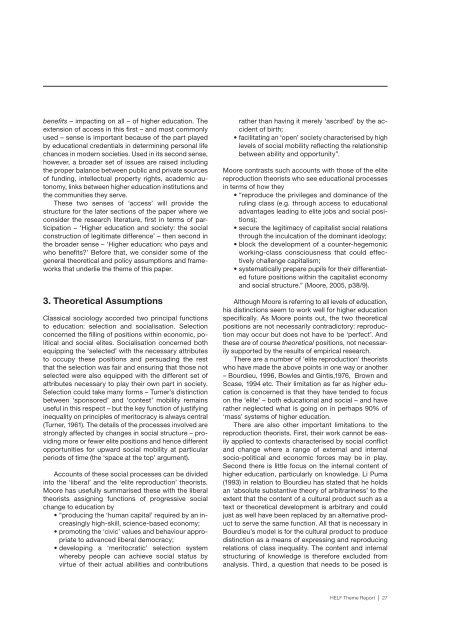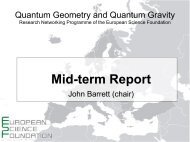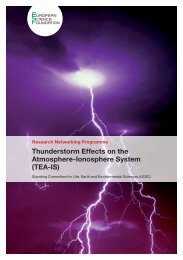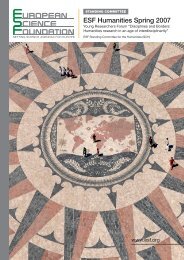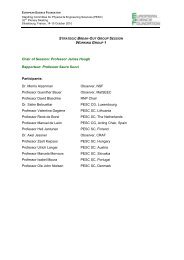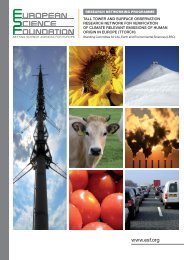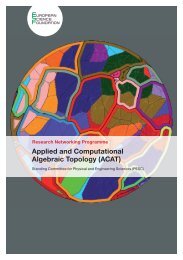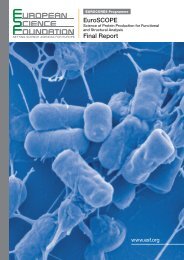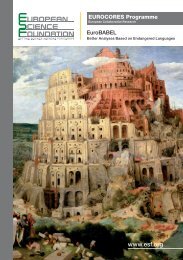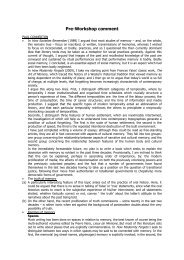Report - European Science Foundation
Report - European Science Foundation
Report - European Science Foundation
You also want an ePaper? Increase the reach of your titles
YUMPU automatically turns print PDFs into web optimized ePapers that Google loves.
enefits – impacting on all – of higher education. The<br />
extension of access in this first – and most commonly<br />
used – sense is important because of the part played<br />
by educational credentials in determining personal life<br />
chances in modern societies. Used in its second sense,<br />
however, a broader set of issues are raised including<br />
the proper balance between public and private sources<br />
of funding, intellectual property rights, academic autonomy,<br />
links between higher education institutions and<br />
the communities they serve.<br />
These two senses of ‘access’ will provide the<br />
structure for the later sections of the paper where we<br />
consider the research literature, first in terms of participation<br />
– ‘Higher education and society: the social<br />
construction of legitimate difference’ – then second in<br />
the broader sense – ‘Higher education: who pays and<br />
who benefits?’ Before that, we consider some of the<br />
general theoretical and policy assumptions and frameworks<br />
that underlie the theme of this paper.<br />
3. Theoretical Assumptions<br />
Classical sociology accorded two principal functions<br />
to education: selection and socialisation. Selection<br />
concerned the filling of positions within economic, political<br />
and social elites. Socialisation concerned both<br />
equipping the ‘selected’ with the necessary attributes<br />
to occupy these positions and persuading the rest<br />
that the selection was fair and ensuring that those not<br />
selected were also equipped with the different set of<br />
attributes necessary to play their own part in society.<br />
Selection could take many forms – Turner’s distinction<br />
between ‘sponsored’ and ‘contest’ mobility remains<br />
useful in this respect – but the key function of justifying<br />
inequality on principles of meritocracy is always central<br />
(Turner, 1961). The details of the processes involved are<br />
strongly affected by changes in social structure – providing<br />
more or fewer elite positions and hence different<br />
opportunities for upward social mobility at particular<br />
periods of time (the ‘space at the top’ argument).<br />
Accounts of these social processes can be divided<br />
into the ‘liberal’ and the ‘elite reproduction’ theorists.<br />
Moore has usefully summarised these with the liberal<br />
theorists assigning functions of progressive social<br />
change to education by<br />
• “producing the ‘human capital’ required by an increasingly<br />
high-skill, science-based economy;<br />
• promoting the ‘civic’ values and behaviour appropriate<br />
to advanced liberal democracy;<br />
• developing a ‘meritocratic’ selection system<br />
whereby people can achieve social status by<br />
virtue of their actual abilities and contributions<br />
rather than having it merely ‘ascribed’ by the accident<br />
of birth;<br />
• facilitating an ‘open’ society characterised by high<br />
levels of social mobility reflecting the relationship<br />
between ability and opportunity”.<br />
Moore contrasts such accounts with those of the elite<br />
reproduction theorists who see educational processes<br />
in terms of how they<br />
• “reproduce the privileges and dominance of the<br />
ruling class (e.g. through access to educational<br />
advantages leading to elite jobs and social positions);<br />
• secure the legitimacy of capitalist social relations<br />
through the inculcation of the dominant ideology;<br />
• block the development of a counter-hegemonic<br />
working-class consciousness that could effectively<br />
challenge capitalism;<br />
• systematically prepare pupils for their differentiated<br />
future positions within the capitalist economy<br />
and social structure.” (Moore, 2005, p38/9).<br />
Although Moore is referring to all levels of education,<br />
his distinctions seem to work well for higher education<br />
specifically. As Moore points out, the two theoretical<br />
positions are not necessarily contradictory: reproduction<br />
may occur but does not have to be ‘perfect’. And<br />
these are of course theoretical positions, not necessarily<br />
supported by the results of empirical research.<br />
There are a number of ‘elite reproduction’ theorists<br />
who have made the above points in one way or another<br />
– Bourdieu, 1996, Bowles and Gintis,1976, Brown and<br />
Scase, 1994 etc. Their limitation as far as higher education<br />
is concerned is that they have tended to focus<br />
on the ‘elite’ – both educational and social – and have<br />
rather neglected what is going on in perhaps 90% of<br />
‘mass’ systems of higher education.<br />
There are also other important limitations to the<br />
reproduction theorists. First, their work cannot be easily<br />
applied to contexts characterised by social confl ict<br />
and change where a range of external and internal<br />
socio-political and economic forces may be in play.<br />
Second there is little focus on the internal content of<br />
higher education, particularly on knowledge. Li Puma<br />
(1993) in relation to Bourdieu has stated that he holds<br />
an ‘absolute substantive theory of arbitrariness’ to the<br />
extent that the content of a cultural product such as a<br />
text or theoretical development is arbitrary and could<br />
just as well have been replaced by an alternative product<br />
to serve the same function. All that is necessary in<br />
Bourdieu’s model is for the cultural product to produce<br />
distinction as a means of expressing and reproducing<br />
relations of class inequality. The content and internal<br />
structuring of knowledge is therefore excluded from<br />
analysis. Third, a question that needs to be posed is<br />
HELF Theme <strong>Report</strong> | 27


